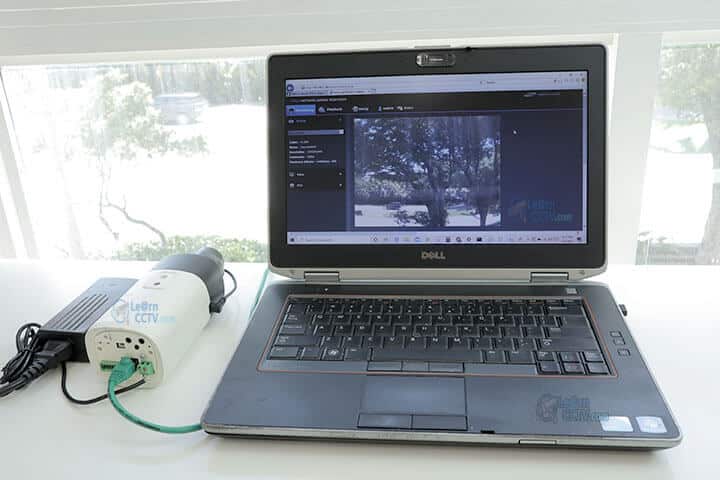In this article, I teach how to connect CCTV camera to laptop without Internet.

This is a common question among people that want a simple solution to view the camera directly on a laptop or PC and usually using an IP camera is the key.
It's important to understand that the term CCTV camera is more commonly used to refer to the old traditional analog cameras and sometimes the real question should be "how to connect an IP camera to a laptop without Internet".
In any case, I understand what people want and I'm here to help.
==> To learn more about this topic, please read the article: What is the difference between IP and CCTV cameras?
Let's dive into the details and make your security camera work with your laptop regardless of the term you use, IP or CCTV camera...
An IP camera is better for the job
The first thing you need is to view the video from your CCTV camera in a laptop is to have it digitized. Once it is in digital format you can use software to display it.
That's why the IP cameras have some advantages, since they work with digital videos that are ready to be sent over computer networks.
So you either have an IP camera or you just use an encoder to convert your old analog camera to digital and send the data over your network or the Internet.
In this article, I assume you have an IP camera and I go from there, but just in case you have an analog CCTV camera just use an Axis encoder to convert it to digital.
Let's see how to get your camera connected to the laptop...
How to connect a CCTV camera to a laptop
OK, the process is very simple and here is what you need to get started:
Here are the step-by-step to connect your CCTV camera to a laptop...
Connect the UTP and power supply to the camera
This step is very simple, you just need to connect the UTP (network cable) from the camera to the laptop, just plug it to both sides and you are done!
The same is true for the power supply, just connect it to your camera.
See the diagram below for a quick reference...
As you can see it's pretty simple, it's just a question of buying the correct devices and cables and everything works fine.
By the way, for the network cable, you can use cat 5e or cat 6 that is long enough for your case, you can buy short patch cords or longer ones.
See the picture below as an example the connection on my IP camera.
As you can see, there's a UTP cable and a power supply connected to the camera.
I'm using a professional IP camera which is a little bit expensive, but you can use a model that is more affordable but still have good video quality.
Set up the camera IP address
Just login to the camera menu and set up the IP address for the same lP range that you are using for your laptop. See the example below:
Device | IP address |
|---|---|
IP camera | 192.168.2.100 |
Laptop | 192.168.2.101 |
For the rest of the network configuration, you can use the same values for both.
Parameter | Value |
|---|---|
Network Mask | 255.255.255.0 |
Gateway | 192.168.2.1 |
DNS 1 | 4.2.2.2 |
DNS 2 | 8.8.8.8 |
Your camera and laptop are directly connected via UTP (network cable), so your laptop won't use the Internet via such a connection because it's NOT connected to a router. Please make you understand the logic behind this setup.
* Your laptop still can have access to the Internet via Wi-Fi connection as long as the IP address range is different and is not conflicting with the setup for the camera.
Here's the example of the IP configuration on the laptop.
The picture below shows the configuration for the camera IP address.
Open the camera via a web browser or software
The last step is just to open a browser and type the camera IP address.
Type the username and password to login to the camera.
The picture below shows the example of the camera live on a laptop.
So it's pretty simple and I think everybody can do it easily.
Keep in mind that you just need to connect the cables, the power supply, and set up the IP address on both devices, that's it.
See the picture below with the final result.
As you can seem, the camera is connected to a power supply and to a UTP cable which is connected to my laptop. I have the image from the camera directly in the web browser. Pretty cool, huh?
Extra information (related articles)
This blog has a lot of useful information and just in case you need to learn something more take a look at the other related articles:
Want to learn more ?
If you want to become a professional CCTV installer or designer, take a look at the material available in the blog. Just click the links below:
Please share this information with your friends...